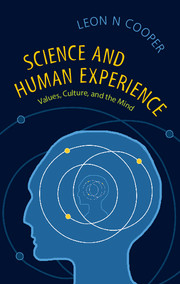Book contents
- Frontmatter
- Dedication
- Contents
- Preface
- Acknowledgement
- Part One Science and Society
- Part Two Thought and Consciousness
- 13 Source and Limits of Human Intellect
- 14 Neural Networks
- 15 Thought and Mental Experience: The Turing Test
- 16 Mind as Machine: Will We Rubbish Human Experience?
- 17 Memories and Memory: A Physicist's Approach to the Brain
- 18 On the Problem of Consciousness
- Part Three On the Nature and Limits of Science
- References
14 - Neural Networks
from Part Two - Thought and Consciousness
Published online by Cambridge University Press: 05 November 2014
- Frontmatter
- Dedication
- Contents
- Preface
- Acknowledgement
- Part One Science and Society
- Part Two Thought and Consciousness
- 13 Source and Limits of Human Intellect
- 14 Neural Networks
- 15 Thought and Mental Experience: The Turing Test
- 16 Mind as Machine: Will We Rubbish Human Experience?
- 17 Memories and Memory: A Physicist's Approach to the Brain
- 18 On the Problem of Consciousness
- Part Three On the Nature and Limits of Science
- References
Summary
What are neural networks and are they good for anything? If so, what? Can they lead to machines that think the way we do?
This essay is based on an article originally published in OMNI Magazine, 11(6) in 1989.
Once upon a time, not so long ago, neural networks were as easy to sell as Rhode Island wine in France. Reading the newspapers and trade journals, one might conclude that things have changed. To a certain extent this is the case. Scientific fashion has undergone one of its seasonal flip-flops. From the wintery opinion that neural networks could do nothing, we have, among the current summertime excesses, the suggestion that they will do everything. But the jury is still out. Commercial enterprises, sensing the possibilities and experiencing success, are beginning to move into the field. A recent study from the Defense Advanced Research Projects Agency, hailing this new technology, endorsing its potential importance and supporting applications to real-world problems, cautiously encourages benchmark tests and comparisons between neural networks and more conventional techniques.
What's all the fuss about? Put somewhat simplistically, we're talking about machines that can think. Now that kind of statement generates anticipation as well as a certain anxiety.
- Type
- Chapter
- Information
- Science and Human ExperienceValues, Culture, and the Mind, pp. 109 - 113Publisher: Cambridge University PressPrint publication year: 2014



